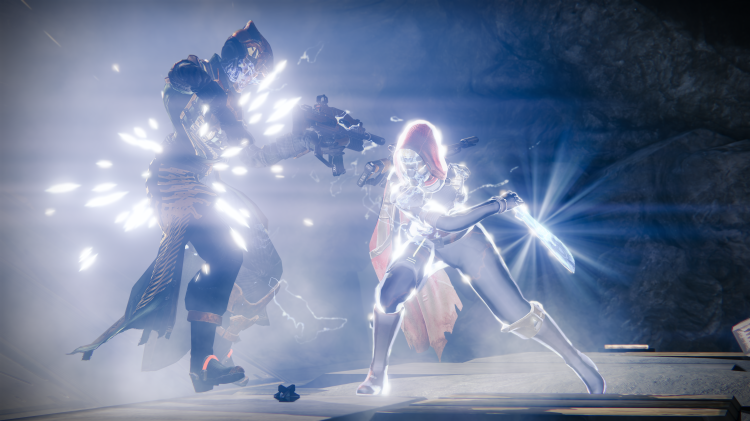That one was terrible, but THIS one will be better
Oh, MMO players: In our hearts, we really do want an option that will allow us to occasionally plant our butts on nice, cushy couches instead of office chairs. Perhaps that’s why we’re so eager to feed into the hype that surrounds every new console MMO title and so willing to tank its user review scores with our bitter tears.
Before release:
“DC Universe Online/Free Realms/Age of Conan/MAG/Mythica/Defiance/Final Fantasy XI/XIV will change the way console gamers play/revolutionize console graphics/be as popular as the PC versions/do it right this time!!”
After release:
“Wait … what do you mean it’s not coming out? We aren’t playing together? It looks like THAT? What do you mean I have to run across the map/get 10 more levels/figure out how to type in Portuguese to get my next quest? ONESTARGRRRRRRR.”
Still, we want them to succeed so badly. Destiny and The Elder Scrolls Online console port are now at the top of our optimism list, thanks to their impressive developer pedigrees.
It’s an MMO. Sorta. Depends on what you mean by “massive”
This tricky no-shoulder cliff road has tripped up games since Phantasy Star Online first debuted its multiplayer online action for the Sega Dreamcast.
Oh, it’s massive all right, until you choose your party and head out. Then you have phenomenal cosmic powers … and teeny tiny living spaces. Whether it’s in DC Universe Online’s superhero-themed small-group Alert missions, a standard small-group fantasy quest in PSO or its sequels, or one of Defiance’s sci-fi solo missions, you can be thrown into a part of the world alone or with a few new friends and never see another soul.
Destiny mixes up its public landscapes with Strike missions that invite just you and a couple of friends along for the ride. Raids will include six. And while you may see dozens of people pass you by if you stay in a public area, you’ll see no more than nine at one time, Smith said.
But wait, there’s more
PC MMOs keep people playing by offering wave after wave of new content. Patches offer free tidbits: the drug dealer’s “free sample” come-ons that keep players addicted from week to week. Expansion packs keep them buying and subscribing, which in turn pays for more development. It’s how games like World of Warcraft, or EverQuest before it, can keep us hooked for a decade.
That model causes issues on consoles. Downloadable content is available, sure — think of that as the expansion packs, purchasable additions to the main game. But free patches are more problematic, especially when the game company doesn’t control the servers the game runs on.
Destiny has two expansion packs already under development, Smith said: “The Dark Below” and “House of Wolves.”
“Those are paid content — and we clearly want to do more than that,” Smith said, adding that even the Halo franchise level of post-release support (map packs, playlist updates) won’t be enough for this audience. “We have to be more reactive and agile than we’ve been. We’ve got a lot to prove.”
So few successful role models to follow
In an industry where sequels rule the shelves, there have been stunningly few console MMO successes to build on. If a game imitates a prior console MMO – or even a successful PC title – it usually fails.
For PCs, games have been building on the success of prior MMO generations since the days that Ultima Online, EverQuest, and Lineage ruled the genre. Even World of Warcraft’s monstrously successful light-fantasy MMO owes a debt to EverQuest – in many ways, it took that model and attempted to eliminate everything about it that players found overly difficult, dull, or distracting.
For console MMOs, no game is safe to copy.
Superhero-themed DC Universe Online was the last truly well-reviewed console MMO before Final Fantasy XIV, all the way back in 2011. But it didn’t inspire universal raves. “It’s decent enough,” said one site at the game’s release, and that was the general consensus. (You can play it free on PS3, PS4, and PC now.)
Gamers met most recent titles with a resounding “meh.” Defiance earned some props as a shooter last year, but the MMO part felt bolted on, the world was static, and the missions redundant. Dust 514 was innovative in concept — its console players essentially acted as mercenaries for PC players — but critics and players slammed it for its poor maps, endless menus, and lack of fun.
Destiny gets more of its DNA from well-reviewed online shooters like Borderlands and the PC version of Sony’s massive online FPS PlanetSide than from traditional PC-based ports like EverQuest and Final Fantasy. PlanetSide 2 will be Destiny’s major competition when it releases for PlayStation 4 this fall.
As a result, while Destiny’s beta was very well-received by the millions who played over last weekend’s open stress test, it didn’t feel particularly massive in-game. And perhaps ironically, to have a successful console MMO, that may be exactly what it takes.
VentureBeat's mission is to be a digital town square for technical decision-makers to gain knowledge about transformative enterprise technology and transact. Learn More




